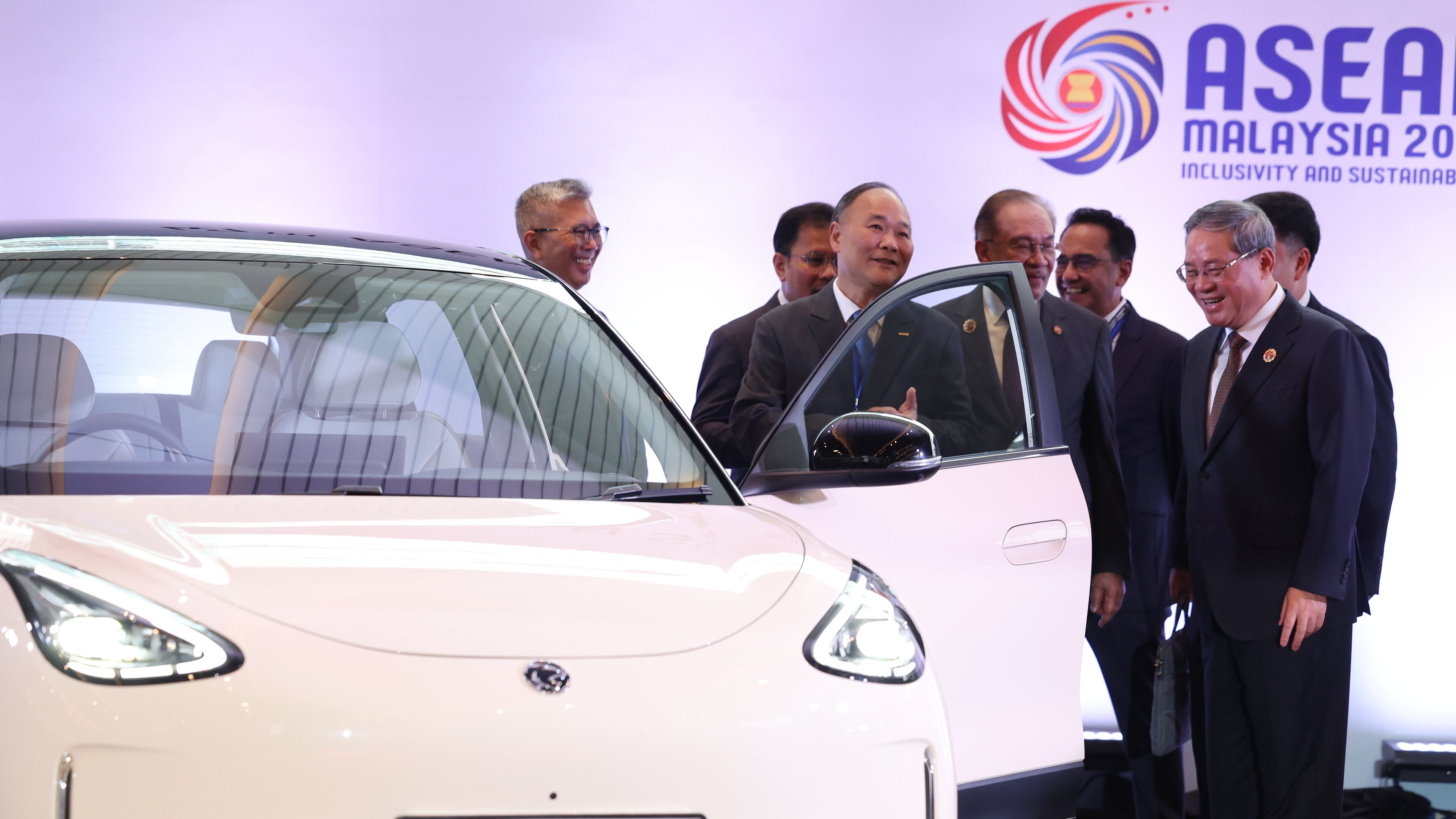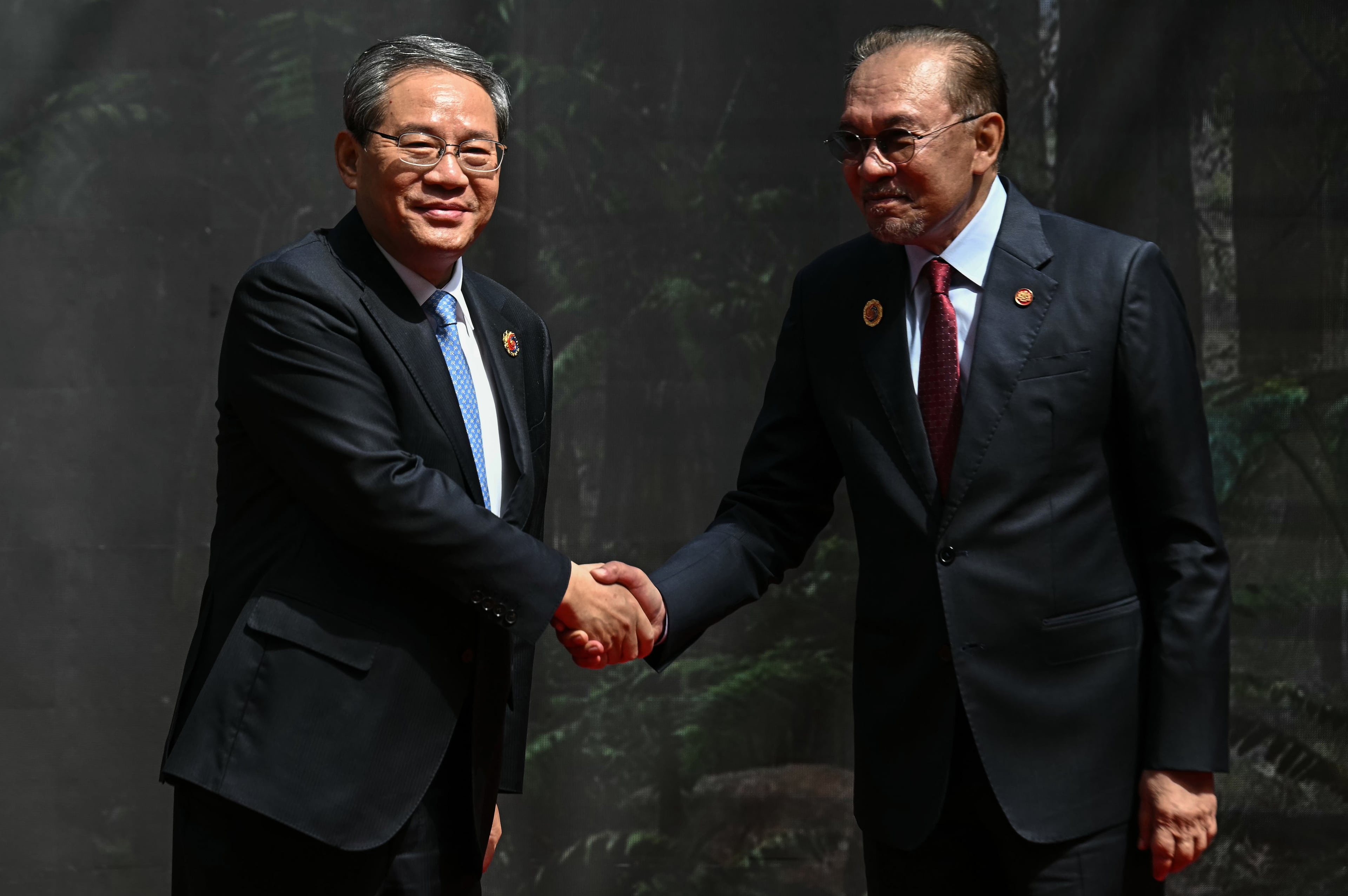China pitches itself as alternative to US protectionism after signing expanded ASEAN free trade pact

KUALA LUMPUR, Malaysia (AP) — China signed an expanded version of a free trade agreement Tuesday with the Association of Southeast Asian Nations, with Premier Li Qiang pitching expanded economic ties with Beijing as an alternative to the protectionist policies of U.S. President Donald Trump.
Li Qiang told an ASEAN-China summit meeting after the signing that closer cooperation could help overcome global economic uncertainties. He said “pursuing confrontation instead of solidarity brings no benefit” in the face of economic coercion and bullying, in a swipe at the U.S.
“Unity is strength,” he said, citing remarks by President Xi Jinping made during a Southeast Asia visit earlier this year.
His remarks were met with skepticism by Philippine President Ferdinand Marcos Jr., whose country has clashed with China over competing claims in the South China Sea, as have other ASEAN nations.
Marcos welcomed the expanded trade pact, but stressed that “this cooperation cannot exist alongside coercion.”
Pact could ease already-booming regional trade
The signing of the ASEAN-China Free Trade Area 3.0 came on the final day of the annual ASEAN summit and related meetings and was witnessed by Li Qiang and Malaysian Prime Minister Anwar Ibrahim, who is serving as ASEAN chair this year.
It’s the third revision of the long-standing agreement, which was first signed in 2002, and came into force in 2010. The free trade area covers a combined market of more than 2 billion people and lowers tariffs on goods and boosting flows of services and investment.
Two-way trade has surged from $235.5 billion in 2010 to nearly $1 trillion last year. ASEAN and China are each other's top trading partners.
Li stressed “mutual reliance” between China and ASEAN members Brunei, Cambodia, East Timor, Indonesia, Laos, Malaysia, Myanmar, the Philippines, Singapore, Thailand, Vietnam, calling them “good neighbors and good brothers that are close in geography, culture and sentiment.”
“Unilateralism and protectionism have seriously impacted the global economic and trade order, while external forces are increasing their interference in the region — many countries have been unreasonably subjected to high tariffs,” he said.
“By relying on each other and coordinating our actions, we can safeguard our legitimate rights and interests.”
Southeast Asian political analyst Bridget Welsh said the upgraded pact would benefit both sides, especially in the areas of supply chains and sustainability.
“It also speaks to a global reality that non-U.S. countries are coming together to strengthen trade relationships for their prosperity as a recoupling with the U.S. is ongoing,” she said,
ASEAN juggles relationships with China and US
The prospect of a deepening trade conflict between China and the U.S. has risked weakening economic growth worldwide.
Trump at the ASEAN summit on Sunday announced new economic details with Cambodia, Malaysia, Thailand and Vietnam, though all countries are still subject to new tariffs he has brought in.
Anwar stressed at the ASEAN meeting with China that the bloc seeks friendly relations with all countries.
“The day before we were with President Donald Trump of the United States of America, and today we are back with China,” he said. "And that reflects ASEAN centrality. ... This is what we consider steady engagement that fosters trust that enables us to work through challenges together.”
There were signs that tensions between the U.S. and China were cooling ahead of a planned meeting between Trump and Xi in South Korea on Thursday. Top negotiators from each country said a trade deal was coming together, which could prevent a potentially damaging confrontation between the world’s two largest economies.
Officials said the ASEAN-China free trade agreement is expected to broaden integration across the region by covering new areas such as digital trade, the green economy, sustainability and support for small and medium-sized enterprises, which make up the majority of ASEAN businesses. The agreement is designed to make trade benefits more accessible, improve market entry for smaller players, streamline nontariff procedures and lower regulatory barriers.
Territorial tensions remain
Marcos said the pact could help modernize trade practices and enable both sides to better respond to emerging economic challenges, but urged China to “commit to cooperation and meaningful engagement, especially in the South China Sea.”
Marcos said it was “regrettable” that Philippine vessels and aircraft continue to face “dangerous actions and harassment” in the South China Sea. He reiterated Manila’s objections to Beijing’s plan to establish a “nature reserve” over a hotly disputed shoal in the area.
“Actions like these cannot hide under the veneer of marine environmental protection because they have no legal basis or effect, blatantly disregard international law, and infringe on the Philippines’ sovereignty,” he said. Still, Marcos added that Manila would continue to engage constructively with China to manage differences.
ASEAN members Vietnam, the Philippines, Malaysia, and Brunei — along with Taiwan — have overlapping claims with China, which asserts sovereignty over nearly the entire South China Sea. Chinese and Philippine vessels have repeatedly clashed in the vital sea trade route.
Marcos has vowed to accelerate the conclusion of a Code of Conduct to govern behavior in the disputed waters when the Philippines assumes the ASEAN chairmanship next year.
In Beijing, Chinese Foreign Ministry spokesperson Guo Jiaku on Monday accused the Philippines of “deliberate infringements and provocations at sea,” blaming Manila for escalating tensions.
Welsh, the analyst, said regional officials treat the South China Sea dispute as a separate track from security ties and don't expect it to impact economic ties with China.
In his remarks closing the summit, Anwar said that there had been consensus for engagement, with Li Qiang agreeing that the Code of Conduct negotiations should be accelerated.
“All agreed that this region should not be an area of contestation of superpowers,” Anwar said.
